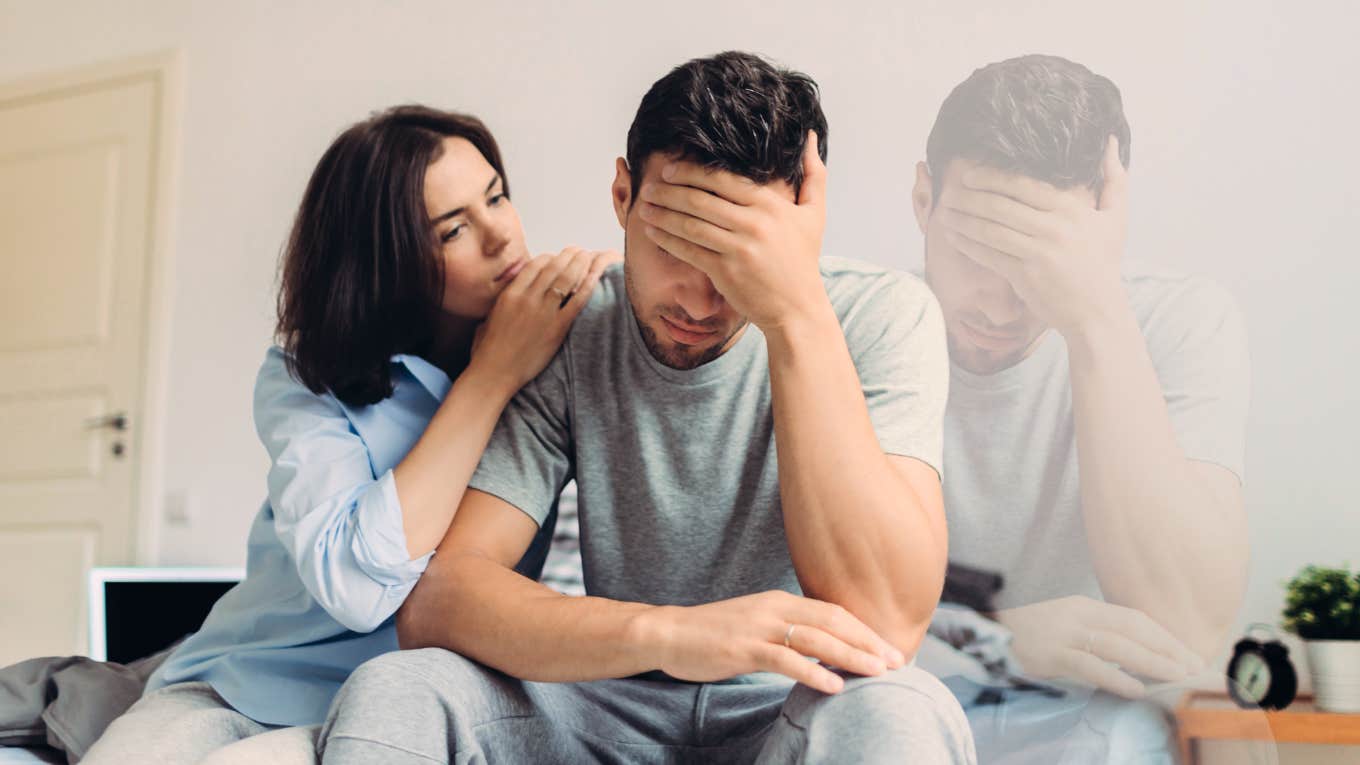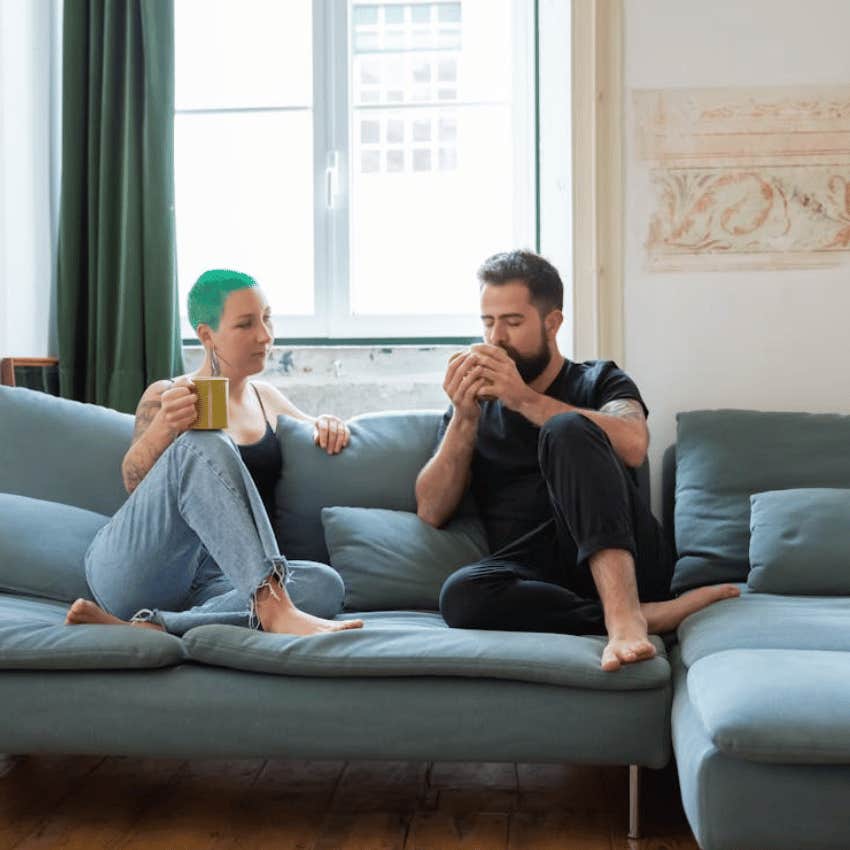My Partner's Health Anxiety Became An Invisible Third Wheel In Our Relationship — 'His Fears Keep Us Homebound'
When my boyfriend's health anxiety is dialed up, it has a trickle-down effect on our relationship.
 vkstudio | Canva
vkstudio | Canva He’s pacing the floor of his home office, wide unblinking eyes exposing the torment inside. Frantic energy palpates as I stand just outside the doorway, peering in. He doesn’t realize I’m here because he’s not here. He’s been suctioned into the vortex of an obsessive mind.
Earlier in the week, he noticed an injured squirrel outside and brought it to the animal hospital. Soon after, intrusive thoughts pummeled his mind, insisting he had contracted rabies.
We talked through the facts: He never touched the squirrel with bare hands, and he hadn’t been bitten. An internet search revealed squirrels aren’t known to transmit rabies. A phone call to his doctor-friend confirmed this. Another call to his primary care doctor re-confirmed it. Their assurances did nothing to quell his fear or conviction.
My boyfriend suffers from health anxiety. He’s been diagnosed with various anxiety disorders throughout his adult life. As a mental health professional, I’d call his health anxiety severe. Its effects can be debilitating, both on my partner and on our relationship.
Health anxiety is the unseen, persistent third wheel in our relationship.
Its voice rings loudly in conversation. Even when it’s quiet, I feel it lurking just around the corner.
Rates of health anxiety are increasing in modern society. Gaining an understanding of exactly what it is and how it shows up is a crucial first step in finding relief — for both the individual and their loved ones.
You may be familiar with the term “hypochondriac,” which refers to someone who worries excessively over their health. Hypochondria has a long and storied history. Since its conception in the 5th century BCE, both the word itself and its definition have been continuously contested. Today, labeling someone a hypochondriac typically comes with implications that they’re crazy, untrustworthy, or unjustified in their fears. It’s coded with an eye-roll and a message: Don’t take this person seriously.
Because of its bad rap, the diagnosis of hypochondriasis has been replaced by two separate diagnoses, somatic symptom disorder (SSD) and illness anxiety disorder (IAD), in the latest edition of the Diagnostic and Statistical Manual of Mental Disorders, or DSM-IV. This decision came with further controversy, perpetuating the long-standing debate in the medical realm over what hypochondria means and what it should be called.
To complicate things more, both IAD and SSD can present similarly to obsessive-compulsive disorder (OCD). All three can involve obsessive thinking and compulsive behaviors, and a subcategory of OCD involves health-related fears, specifically.
Sorting through the nuances of each diagnostic label can give you a headache. I know from experience. Ostensibly for clarity’s sake, “medical professionals today tend to default to the term ‘health anxiety,’ which seems to blend well with the current practical vocabulary of mental health, while in conversation most people still say hypochondria,” writes author Caroline Crampton in her 2024 book, A Body Made of Glass: A Cultural History of Hypochondria. Essentially, the term “health anxiety” is a catchall, something that can exist within several DSM-IV diagnoses, but not a diagnosis in itself.
Someone afflicted by health anxiety typically exists in one of two domains: Either their fear of being sick drives them to seek repeated medical appointments, or it overwhelms them to the point of avoidance.
The brand of health anxiety in my relationship is the former. It’s common for my partner to seek second, third, and fourth opinions from medical providers, even when tests reveal a clean bill of health. This is an excruciating hallmark of the disorder: Persistent intense fear of having an illness despite normal lab results and physical exams.
When health anxiety convinced my boyfriend he had rabies, a slew of medical appointments concluded there was a zero percent chance he was right, but he was unconvinced. Finally, he called the state health department. After explaining his situation, he was told the likelihood that he had rabies was so low that if he went to the hospital asking for a rabies shot, they wouldn’t even consider giving it to him.
A switch flipped and weeks’ worth of anxiety suddenly lifted. I can’t give the rationale for this because it’s not rational. My boyfriend explained that he needed to hear a confident, unambiguous answer from an authority figure to ease his distress. In her book, Crampton writes that when she’s convinced herself she has an illness, she seeks from doctors “the absolute, definite negative that [sends] me skipping home, my mind liberated from panic.”
Understandably, an “absolute, definite” answer about a health concern yields peace of mind. The thought process that convinces a person that their entire life and well-being hinges on hearing the exact right combination of words from their doctor is also understandable, albeit less rational. Guarantees are hard to come by, and health anxiety floods the mind with distorted lines of thought.
How and why the distorted thoughts of health anxiety start showing up are questions with unclear answers. Likely, similar to many mental illnesses, both genetic and environmental influences are at play. There’s evidence of health anxiety’s possible association with childhood illness and trauma, according to a 2024 review of the current research published in the journal Current Psychiatry Reports.
The same report suggests health anxiety could be inherited; a trait passed down from generation to generation. Or, it might develop as a result of being raised by health-anxious parents, learning and mimicking their thoughts and behaviors.
Whatever its source may be, we know for certain that health anxiety is on the rise. That review published earlier this year revealed growing rates over the past three decades. Recently, concerns related to the COVID-19 pandemic contributed to health anxiety’s upsurge worldwide.
Many of us were anxious about our health during the pandemic — a normal response to the circumstances. However, some people have experienced ongoing heightened health-related anxiety despite the mitigated threat. Their anxiety no longer matches the facts of the situation. That’s an important distinction between appropriate (“normal”) anxiety and an anxiety disorder.
The COVID-19 pandemic was my partner’s worst nightmare turned into reality. He’s made strides in terms of re-entering society, but it’s taken concerted effort. Health anxiety continues to plant seeds of doubt about going into a restaurant or the grocery store, for example. Large indoor gatherings can still induce panic. There’s a compulsion to immediately shower upon returning home from most outings.
 Kampus Production | Pexels
Kampus Production | Pexels
When my boyfriend's health anxiety is dialed up, it has a trickle-down effect on our relationship.
A requirement for diagnosing almost any mental illness is that a person’s symptoms significantly impact their daily functioning. Their struggles might prevent them from keeping a job, maintaining personal safety, or caring for their children. Or, they might become a disruptive tag-along to an otherwise harmonious relationship.
Whenever my boyfriend asks me to look at a bump or bruise on his body, my breath catches for the slightest moment. I brace for whatever catastrophe is brewing behind his words while mustering my most nonchalant, “Yeah, sure.”
How I proceed from there — spoken words, tone of voice, facial expressions — could play a crucial role in determining how rowdy health anxiety will get for the day, week, or month. Thankfully, I’m not an alarmist by nature. But I’m also not a medical expert, so my feedback can only do so much to assuage oncoming panic.
What unfolds next depends on the story health anxiety embeds in my boyfriend's mind: Has it convinced him he has cancer? An ulcer? A non-life-threatening but untreatable skin condition? His pre-existing mood and stress level also play roles in how consuming the anxiety becomes. Generally, if he’s feeling well and satisfied otherwise, he’s better able to combat the attacking thoughts.
When health anxiety is at its loudest, it keeps us homebound. It causes us to cancel plans with friends and family; it keeps us from eating out, going to the movies, and traveling. It colors how we discuss plans surrounding marriage, kids, and financial goals. When it comes time to make decisions, health anxiety instigates arguments, tension, and hurt feelings between us.
Some of the toughest moments are when I get sick. Health anxiety prompts my partner to avoid being in the same room as me, treating me as an outcast in our home.
It’s important to emphasize it’s not my partner who rejects me when I’m sick or who hesitates to make social plans — it’s the health anxiety.
I remind myself often that he is not his illness. While I’m affected by his anxiety, he’s tortured by it. Treatment options for health anxiety include medication, therapy, or, ideally, a combination of both. Cognitive behavioral therapies (CBT) are effective at alleviating the disorder’s emotional turmoil, research shows. Deciding to engage in therapy means committing to change, and change comes with discomfort.
Participating in CBT for health anxiety typically involves exposing oneself to anxiety-provoking situations. The goals are learning to tolerate the feelings that arise while noticing and challenging irrational thoughts. It’s difficult work, and it’s not a quick fix, but with dedication and patience, it can make life easier for clients and their loved ones.
I’ve witnessed my partner improve his (and our) life by using strategies he’s learned in therapy and consistently taking his anxiety medication. His rabies scare happened over a year ago, and none of his episodes since have lasted as long or felt as extreme.
Health anxiety is still the third wheel in our relationship. Instead of trying to push it out, we’re making room for it. And now that it senses more acceptance, it doesn’t feel the need to be quite so loud.
Giana Porpiglia is a licensed mental health counselor. She writes about relationships, identity, and being human.

